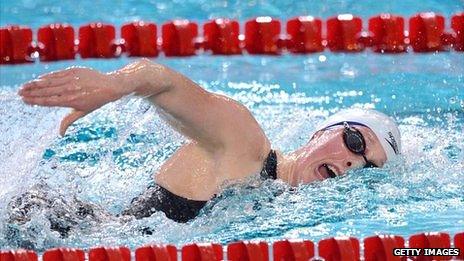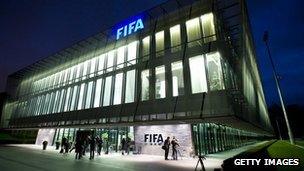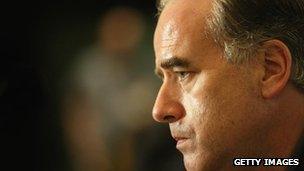Sports leaders to learn business rules of the game
- Published

British Swimming says sports bodies must be run effectively from the top
Sports organisations and clubs are finding themselves increasingly in the spotlight, as they generate both growing revenues and media coverage.
Global football's governing body Fifa has found its governance coming in for sustained criticism, while the hierarchy of rugby union's RFU has been embroiled in a year of internecine strife.
More recently the global cycling body, the UCI, has found itself under criticism over the Lance Armstrong affair, with calls for its top administrators to stand down.
It is to avoid the potential pitfalls that can accompany being on a sports body - be it club or federation, global or grassroots - that the UK's Institute of Directors (IoD) has drawn up a sports good governance programme.
Its first two-day Board Skills for Sport course will be held in January.
"Sport is under more scrutiny now than ever before, be it from stakeholders or shareholders," says Ryan Ahern, training and development director at the IoD.
"It means there needs to be more transparency about who should be on the board of a sports organisation or club, and what their role is.
"There is a desire by sports bodies to get existing members up to speed on what their duties entail, and also to bring in new blood and more independent directors."
'Accountability'

Transparency International cut its ties with Fifa
UK Sport and Sport England have recently introduced new governance requirements for their funded organisations, rules that stipulate board composition, and in particular the percentage of a board required to be independent.
Independent directors advise an organisation of its responsibilities with regards to good governance, and help ensure its financial stability and most appropriate use of funds.
As well as explaining these obligations, the IoD will also outline the broad structure of the sport and recreation sector, and the selling and marketing of sport.
"To some extent sports governance is its own little world, where they do things differently, where they don't need to take account of the way other business sectors do things," says Roger Barker, the IoD's head of corporate governance.
"Each business sector has different needs, but accountability and transparency is needed across all sectors.
"What is going on at Fifa is of great interest. Is there genuine transparency? It is very opaque."
Fifa did bring in Prof Mark Pieth in 2011 to head up its independent governance committee.
But the fact that Fifa was paying him drew criticism from anti-corruption body Transparency International, which then cut its ties with world football's governing body.
'Cultural shift'
Six years ago the institute proposed a similar course for football club directors - to be run under the aegis of the Football Association.
But there was a lack of interest and it did not get off the ground.
Whatever the current attitude now in some echelons of football, the new training initiative has been driven by a number of sporting bodies, including the FA.

Tim Lamb of the SRA says that sport governance poses unique challenges
The IoD is working in conjunction with the Sport and Recreation Alliance (SRA), the umbrella organisation for the governing and representative bodies of sport and recreation in the UK.
Formerly known as the Central Council of Physical Recreation, it represents more than 300 members - from the FA and RFU to the Ramblers and the Exercise, Movement & Dance Partnership.
"The sports sector has undergone a huge cultural shift in recent years, with the emphasis shifting from predominantly amateur to a much more professional and commercial approach," says Tim Lamb, chief executive of the SRA and a former head of the England and Wales Cricket Board.
"The boards of sporting organisations have had to modernise quickly in order to deal with this change, and board members who have always offered a wide knowledge of the sporting environment are now also having to develop high-level business skills in order to make sure their organisations don't get left behind."
He said experienced businesspeople from other sectors might not always be aware of the particular nuances and characteristics that the sport sector possesses, hence the need for training.
One organisation backing the new initiative, and which agrees that sporting organisations need to up their game, is British Swimming.
It has seen a number of UK successes at the recent European Short Course championships in France.
'Passion'
Craig Hunter, board member of British Swimming and chef de mission of Paralympics GB, says sporting excellence could only be "achieved by organisations that are run effectively from the top".
And he said that improving the strength of sports administration could have a commercial pay-off by making organisations more efficiently run.
Such has been the enthusiasm for the initial proposal, that a second course is being held in June, and the IoD is also being asked to go into sporting organisations and address board members.
"Many people join charities, arts bodies, or sporting associations because of a passion, but don't really have a great knowledge of what it is to be a director," says Mr Ahern.
"They need to know exactly what they are doing. It is not enough to be passionate about something - you have to be properly equipped for the task."